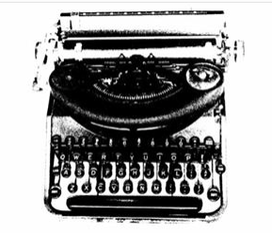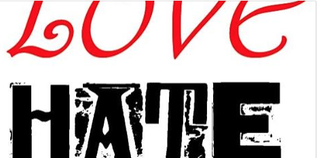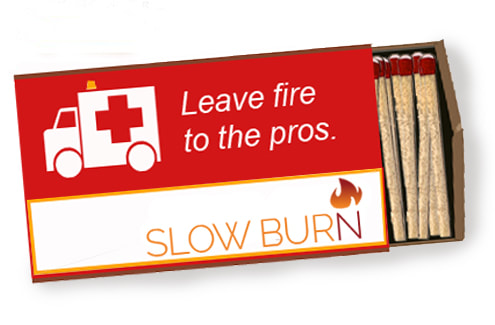 Last time, we touched on the mutually inclusive ideas of social media and SEO. It's gratifying to know that some of you found that little rant to be useful. Thanks for the notes. One can only assume that those who remained silent were snoring in the back of the class over that one. So it goes. It's still worth every penny you pay for the product. (Yay, freebies!) Next up, we have a really interesting question. This reader to Hot Shots asks, "How can I, as an employee, build a strong personal brand?" Obviously, the first thing to do is make a lot of noise. YELL. THROW THINGS. BERATE YOUR FELLOW WORKERS. There ya go. My work here is done. See you next time! OK, in seriousness, that kind of performance will certainly create a brand. Maybe not a desirable one. But it works for some people. But it probably won't work for our friend here, who works for a group of very friendly and conscientious radio stations. He goes on to say, "When I say personal brand, I'm not only talking about how our clients feel about me, but how my colleagues feel about me." (See how he's been hanging around here long enough to be using the vernacular? How people "feel about me." Feelings rule branding. Right on!) "For example, I've had to work hard to earn the trust of our sales reps. I've done this by taking specific steps (being open minded to their ideas, never getting flustered or raising my voice at them, working long hours to meet deadlines). I do this to gain a positive reputation which, now that I think of it, is kind of like a brand." OBVIOUSLY, ONE COMPONENT OF THIS GENTLEMAN'S BRAND IS SELF CONTROL He might even be a candidate for sainthood. That aside, he is definitely on the right track for establishing a solid personal brand. And yes, what we're about to discuss is personal brand couched in the context of a radio station creative department. Despite that, personal brand is applicable across the board. ANYONE can benefit from a strong personal brand--but probably nobody more so than a sole proprietor or solopreneur. See also: personal brand in the context of comedians. Every successful comedian has a personal brand. That brand is always a sliver of his or her personality amplified many times over into a comedic stage persona. THAT STAGE PERSONA IS THE MARKETABLE CASH COW OF PERSONAL BRAND Jeff Foxworthy is the "You might be a redneck if..." brand. He comes off with affable-redneck, good-old-boy charm. He has parlayed his personal brand into the hugely popular Blue Collar Comedy empire. He makes a killing along with a fellow personal-brand expert, Larry the Cable Guy--he of the good-natured, working-class, "Git 'er done" persona. You probably never heard of Jacob Rodney Cohen. Jacob was a failed entertainer who had dropped out of show business to become an aluminum siding salesman. When Cohen tried to revive his comedy career, he went deeply into debt. Cohen finally realized he was lacking a personal brand. He did something about it. Goodbye, Jacob Rodney Cohen. Hello, Rodney "I don't get no respect" Dangerfield. As you know, his brand was as the guy for whom nothing ever goes right. The failed entertainer and aluminum siding salesman became an icon and an obscenely wealthy man. PERSONAL BRAND IS CRITICAL TO SOLOPRENEUR SUCCESS When you're a single person swimming in a sea of me-too-ness, standing apart and being the desirable choice can be the difference between mere survival and making a killing. One of the killer motivational brands of the 21st century is Timothy Ferriss. There are all kinds of experts out there trying to capitalize on the century-old Think And Grow Rich model. Tim Ferris has capitalized on that like nobody else with his 4-Hour Work Week empire. He's taken the "work smarter, not harder" dynamic and turned it into a bestseller ride at the New York Times, Wall Street Journal and USA Today. How much different is he than a lot of other solopreneurs plying this same trade? Not a lot, when you get right down to it. He might be better educated (Princeton) and a better athlete (kickboxing), but his ideas are not that far outside of convention. THEY'RE JUST PACKAGED AND PRESENTED BETTER AS PART OF A KILLER BRAND Circling back to our radio guy's question, how can he as an employee, build a strong personal brand? Time to consider this: exactly what one thing do you want to be known for? I know an ad agency copywriter whose personal brand was as the "No Problem!" copywriter. This copywriter's job as a freelancer was to come in and make things work when others were having challenges. Whatever this copywriter was asked to do, the answer was always, "No problem!" The demeanor was always cheery. There was never any resistance. The ideas were always top-notch and out-of-the-box. This talented copywriter was determined to be a pleasure for everyone involved--but probably no more so than for the Creative Director who had made the call in the first place. CAN YOU SAY, "FULL-TIME INCOME FOR WORKING HALF THE YEAR"? This copywriter had an impressive run in Los Angeles and New York and always worked. In my case, my personal brand as a copywriter didn't work out exactly as I had planned it. About 20 years ago, when I first walked into a Los Angeles radio station as a copywriter, I did it with a singular goal: produce work as good as what was coming out of national advertising agencies. Admittedly, there were times where we actually achieved this goal. The multiple national awards are evidence. But very quickly, it became apparent that in the context of radio, that goal isn't always appropriate. For one, there's a lot of direct response advertising that doesn't lend itself to the kind of creative that big ad agencies produce. Moreover, with DR, you live and die by response. SO IF THE PHONE ISN'T RINGING, SOMETHING'S WRONG And often, the task is to figure out what that something is and replace it with better. My personal brand became something much different than originally planned. I became the guy who raised the bar on DR. Many account reps wouldn't come to me immediately. They would start with whatever direction seemed appropriate. If that direction failed, they showed up in my office. "This isn't working. What do we do about it?" Or, if they had something they knew immediately was going to be challenging, they'd come looking for a solution. I had become the DR Problem Solver. Got a failing campaign? Bam! Quadrupled response overnight. Got a script that isn't making anyone happy? Here's why it feels wrong, let's fix it. Got a client who needs to sound different than the other five advertisers just like him? Here's a new direction. WHEN "GOOD ENOUGH" WASN'T CUTTING IT, I WAS YOUR GUY Today, close to a decade after leaving that gig, I still get calls from radio people who need help raising the bar. (Interestingly, most of the time, they're unwilling to pay for it. They get caught up in the poverty mindset of radio station budgets. But that's a whole other screed.) When I was busy doing this in LA, there was another writer who was widely recognized as the person to call when you wanted an idea that was way over the top. This writer had a hugely successful business creating radio advertising that was out-of-the-park hilarious. You could hear a commercial on the radio, and as soon as you were done wiping the spit-take off the inside of your windshield, you knew immediately who had created it. STRONG PERSONAL BRAND--KNOWN FOR ONE THING AND ONE THING ONLY So, all this said, it's great to be known for diplomacy. It makes people feel comfortable. They know they can work with you. But what's the writing talent? What do you inject into your work that nobody else does? Can someone hear the work on the air and know immediately who created it? There are copywriters all over the country who have that kind of style. Whether it's TV or print or whatever--it has their fingerprints all over it. I would frequently get phone calls or emails from radio people asking me, "Did you do that new spot for so-and-so? Killer!" BE INDELIBLE Figure out not just what kind of diplomat you want to be, but what kind of artist. Yes, "artist" might sound lofty. But we're talking about taking mere facts about a business and spinning them into a tapestry that makes the prospect want to pick up the phone. The prospect needs to feel something that inspires him or her to take action. To paraphrase everyone's favorite unreliable resource, Wikipedia, art is about creating an artifact expressing the author's imaginative or technical skill, intended to be appreciated for its emotional power. YES, A RADIO COMMERCIAL IS DESIGNED TO DRIVE TRAFFIC But it does that by eliciting an emotional response in the prospect. The writer's skill here is key. In every case discussed here, it all boils down to emotional power. And that, my friend, is how you do or don't get no respect as a personal brand. It doesn't matter whether you're a copywriter or a solopreneur or running a 7-figure operation. No matter who you are or what your brand is, make them love you or make them hate you. But make them feel something. And doing that requires a skill. What's in your toolbox?
0 Comments
 Happy New Year, my friend. You've been undoubtedly partying around the clock since last Thursday, which was the beginning of a near 4-day weekend. But yesterday, Monday, January 4th, you met the sunrise with bleary eyes, a besotted smile and new determination. You've since been on Amazon, packing your smoking Kindle with motivational books like Drink And Grow Rich and The 7 Bad Habits Of Highly Successful Hedonists and Be The Cat. Well, as you'll recall, late last year you were solicited for the burning-hot topics on your mind. It was promised that we'd do our best to address those topics here in the weekly screed. AND NOW, THE TIME HAS COME... We're going to look at the first of many to follow over the course of the next several months. The topic with which we're kicking this all off may seem unusual. But set against the backdrop of the new year, it seemed somehow appropriate. And admittedly, it was not a question that anyone ever would have anticipated. We certainly didn't. The problem is, as unlikely as the question seems, it represents a challenge that some of us have probably faced at one time or another. ESPECIALLY IF YOU'RE IN SALES, THIS MAY HAVE COME UP IN YOUR LIFE I know that I've encountered this personally. The question comes to us from a corner of our country filled with very, very smart people. It was submitted by a very literate writer. And that question is this: How does a company market when it hates customers? There was no way to see this one coming. And it's a winner. Not only does this test me personally, but it seems to be a topic that isn't covered in the bestselling motivational press.They prefer things like Bike Shorts Billionaire: How To Pedal Your Way To Riches On The Seat O A Schwinn. WE EXPERIENCED A VERSION OF THIS WHEN STARTING AN AD AGENCY Granted, we never said that we hate customers. But whenever I would propose the idea of starting an agency to The Fabulous Honey Parker, her response was often something like, "The problem with having an ad agency is having clients." And that would invariably squelch any further discussion. Because, as everyone knows, clients are a pain in the butt, right? Well... Not all clients. Just problem clients. And we came up with a simple solution to the challenge of problem clients. We don't take them. We vet our prospective clients very carefully. And we have an important yardstick: we will not accept any client with whom we wouldn't want to have dinner. BUT THIS IS MERELY YOUR FAITHFUL SCRIBE DANCING A TARANTELLA AROUND THE QUESTION How does a company market when it hates customers? The simple answer is to just get out of the business. If you hate the people who are looking to you to solve a problem, a new business removed from those people would seem like a wise choice. On an individual level, I've witnessed this with high-ticket retail salesmen. After a while, some of them begin to develop a contempt for the people who put food on their table and silver spoons in their children's mouths. Look at car salesmen. For an artful depiction, look no further than Glengarry Glen Ross. When I worked in high-ticket retail sales, there were guys so far down that rabbit hole, you wondered how they got out of bed in the morning, much less found their way to work. Even I would occasionally experience pangs of such behavior. THAT'S A SIGN THAT IT'S TIME FOR AN EXIT STRATEGY But I never actually hated customers. And hating customers has to be a challenging way to go through a professional life. One solution is to get as far away from having to deal with customers as possible. Become a welder. Metal doesn't talk back. Operate heavy equipment. Get your ya-yas out using heavy metal to smash through dirt and rock. Wash windows. Customers don't want to talk to you. They just want the damn windows to squeak. Grow pinto beans. They make your customers fart. Start a mink farm. Minks are nasty. They could make you feel better about customers. BUT LET'S JUST SAY THAT NONE OF THAT IS POSSIBLE Let's say that the one and only thing your company does is the only possible way there is to make a living. If you hate customers, what do you do about it? The first thing is probably to indulge in a little self-examination. What is the root of this hatred? Is it pure misanthropy? (If your English vocabulary development was somehow thwarted at age 12, misanthropy is a general hatred or contempt of human beings.) If so, it then becomes necessary to figure out the roots of this misanthropy. Plato connected misanthropy to isolation from society. He claimed that misanthropy develops when you're artless and naive, you trust someone, and then get kicked in the nuts. So to speak. When this happens enough, the victim ends up hating everyone. Aristotle was a little more existential about it. He pegged the misanthrope as solitary, and not a man at all, but a beast or a god. LET'S FACE IT: IF YOU'RE A BEAST OR A GOD, THERE'S NOT MUCH REASON TO BE MARKETING Moreover, nobody is likely to kick you in the nuts. But if you're a Platonic misanthrope? That's another story. Do you hate customers because they're constantly kicking you in the nuts? Looking inward might be a good idea. What is the company doing that gives the customer permission to wind up with the right leg and follow through? But wait. Maybe it's not the customers specifically. Maybe it's just general misanthropy brought about by life, the universe and everything? If so, maybe it's time to unleash Schopenhauer. He was an early influence Nietzsche, so you know he was a laugh riot. Schopenhauer was notoriously misanthropic. He was even anti-baby. He thought having kids was a lousy idea because life is ultimately full of K-Marts and suffering and there would never really be enough ice cream sandwiches and other good stuff to go around. That said, he didn't believe that being a misanthrope means we should all just crap on our fellow man. Instead, we should treat everyone well because hey, we're all in this pig trough of carbonated swill together. Even the Kardashians. ARE WE GETTING TOO FAR AFIELD OF THE MARKETING QUESTION HERE? Probably. You know I have a bad habit of taking a ball and running off the field with it. Let's circle back to the idea of how a company markets itself if it hates customers. Assuming this company MUST exist, assuming there is no other alternative to running this business, here's one possible solution. Look to the man known (for real) as the Socrates of San Francisco, Howard Luck Gossage. A Mad Men era iconoclast, Gossage launched some astonishing ad campaigns in his day. For my money, one of his best quotes is, "The object of your advertising should not be to communicate with your consumers or your prospects at all but to terrorize your competition's copywriters." As a copywriter, it's hard to not love that. But one of Gossage's most famous quotes has become the glurge of the motivational poster industry, a disappointment which belies the actual brilliance of the philosophy: "When life gives you lemons, make lemonade." AND THIS IS A PERFECT PLACE TO IMPLEMENT THAT ADVICE If you hate customers, make that absolutely clear in the marketing. Become the Eeyore of your business category. Become the David Letterman of whatever you sell. Revel in it. Hate customers? Take a position so repellent, so "You are not worthy," so disdainful of the person wishing to buy it, that they have no choice but to want it even more. Here now: Tom Sawyer, misanthrope. "Not only are you incapable and unworthy of painting this fence, but just for trying you'll probably end up getting kicked in the nuts." Take that, Schopenhauer. If the product the company sells is truly sound and delivers what it promises, then go on a full offensive. Harness the misanthropy that makes you hate customers and use it to bring joy to the prospect. HELLO, ARROGANT BASTARD ALE "Hated by many. Loved by few. You're not worthy." This is the beer from Stone Brewing that freely asserts that you personally lack the sophistication required to appreciate it. Right there on the label, it tells you that you probably won't like it and you should just go back to that fizzy yellow beer you've been drinking. We're talking an exercise in making the company the antichrist of whatever niche it serves. As the man said, make them love you or make them hate you, but make them feel something. And here at the Mountaintop Marketing Fortress, we always bang the drum for authenticity. Well, if the company authentically disdains its customers, harness that disdain. Trot it out in a three-ring dog & pony show of contempt so genuine, the customer would be hard pressed to not be fascinated. This solution obviously isn't for everyone. It isn't for me personally. It certainly isn't for the more spiritual reader. I know at least one nihilist out there who will love it. Bottom line: in a squishy, politically correct climate like the one we're immersed in now, it could be just the thing to make people feel better, and to have those damned customers beating a path to your door. Happy New Year! |
AuthorBlaine Parker is prone to ranting about any and all things related to brand. In many ways, he is a professional curmudgeon. While there is no known vaccine for this, the condition is also not contagious. Unless you choose it to be so. Archives
February 2022
Categories
All
|
|
© Copyright 2020 Slow Burn Marketing LLC |

 RSS Feed
RSS Feed

